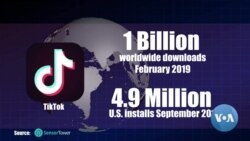It has captured the attention of teenagers, celebrities and global brands.
And now U.S. lawmakers and regulators are interested in TikTok, the video app downloaded by 1 billion people.
According to Reuters, the U.S. government is launching a national security review into the Chinese company ByteDance’s 2017 acquisition of U.S. app Musical.ly. ByteDance is the parent of TikTok, which makes it easy for users to make videos 15 to 60 seconds long.
WATCH: US Raises Security Concerns Over Chinese-Owned TikTok
National security concerns
The move comes at a time when lawmakers have called for increasing scrutiny of Chinese companies and their investments in the United States. Some lawmakers question whether TikTok censors users and how safe U.S. user data is if it is held in the hands of a Chinese company.
ByteDance has repeatedly defended itself. In a recent blog post, it said that U.S. user data is stored in the United States. As for content moderation, the company said its “U.S. moderation team, which is led out of California, reviews content for adherence to our U.S. policies—just like other U.S. companies in our space.”
In China, ByteDance owns Douyin, a Chinese version of TikTok.
Making a viral video
For users of TikTok, the app is a way to make a short vertical video, similar to Vine, which Twitter shut down in 2017. Video editing tools are built into the TikTok app, with a music library to choose from, so that a video can be made and posted in a school hallway between classes.
Scrolling through TikTok videos is a window into pranks played on parents and friends, dance routines in school bathrooms or in backyards. Users say that watching the videos are addictive and a quick check of TikTok can lead to hours spent watching video after video.
Silicon Valley takes note
Competitors such as Facebook and Snap, the parent of Snapchat, have not missed TikTok’s rise. They are either imitating the company or looking to acquire a similar one. Facebook has its own service called Lasso. Google, which owns YouTube, has had talks about buying a TikTok competitor, The New York Times reported.
Mark Zuckerberg, Facebook’s CEO, recently said that “China is building its own internet focused on very different values, and is now exporting their vision of the internet to other countries.”
This isn’t TikTok’s first run in with U.S. regulators. Earlier this year, it paid a $5.7 million fine to the U.S. Federal Trade Commission over how it had illegally collected information about children under 13.









